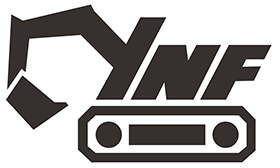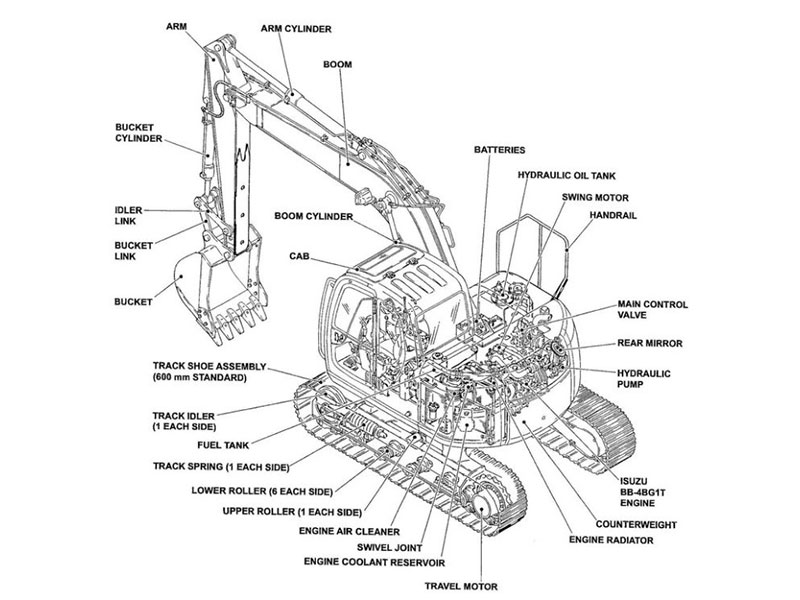
Choosing the right excavator engine oil grade plays a vital role in maintaining your machine’s performance and extending its lifespan. Engine oil reduces wear by lubricating moving parts, ensuring smooth operation under demanding conditions. It also improves efficiency and prevents costly repairs caused by friction or corrosion. Using the wrong oil can lead to reduced pressure, engine leakage, or even severe operational inefficiencies. By understanding oil grades, you can make informed decisions that protect your equipment and keep it running at peak performance.
Key Takeaways
Choosing the right engine oil grade is crucial for maintaining your excavator’s performance and extending its lifespan.
Understand SAE viscosity grades to select the appropriate oil for your climate; lower numbers are better for cold conditions, while higher numbers suit warmer environments.
Always refer to your excavator’s manual for the recommended API performance classifications to ensure compatibility and optimal operation.
Regular oil changes are essential to remove contaminants and restore lubrication, significantly increasing your engine’s longevity.
Avoid using the wrong viscosity grade, as it can lead to increased wear and operational inefficiencies.
Proper storage and handling of engine oil prevent contamination and ensure its effectiveness over time.
Consult trusted suppliers like YNF Machinery for high-quality oils that meet your excavator’s specifications and enhance performance.
Understanding Excavator Engine Oil Grades

Choosing the right excavator engine oil grade requires understanding key classifications and specifications. These details ensure your equipment operates efficiently under various conditions. Let’s explore the essential aspects of engine oil grades.
What Are SAE Viscosity Grades?
SAE viscosity grades measure how thick or thin an engine oil is at specific temperatures. This classification, developed by the Society of Automotive Engineers (SAE), helps you determine the oil’s flow characteristics. For example, SAE 10W-30 indicates the oil’s viscosity in both cold (10W) and hot (30) conditions. Lower numbers like SAE 5W-30 perform better in colder climates, while higher numbers such as SAE 15W-40 suit warmer environments.
Multi-grade oils, such as SAE 10W-30 or SAE 15W-40, are versatile and adapt to a range of temperatures. These oils reduce the need for seasonal changes, making them ideal for excavators operating in varying climates. Caterpillar excavators, for instance, often use SAE 5W-30 or SAE 15W-40 based on the ambient temperature. Selecting the correct viscosity grade ensures proper lubrication and prevents engine wear.
API Performance Classifications and Their Importance
The American Petroleum Institute (API) assigns performance classifications to engine oils, indicating their suitability for specific engines and operating conditions. These classifications, such as API CJ-4 or API CH-4, reflect the oil’s ability to meet modern engine demands. For excavators, API CJ-4 oils are highly recommended as they exceed the performance of older classifications like API CI-4 or CF.
API classifications also ensure compatibility with diesel engines, which are common in excavators. For example, multigrade diesel engine oil meeting API CJ-4 standards provides excellent protection against soot buildup and oxidation. Always check your excavator’s manual for the recommended API service classification to maintain optimal performance.
Common Excavator Engine Oil Grades and Their Applications
Excavator engine oils come in various grades to suit different applications. Common types of engine oil include SAE 10W-30, SAE 15W-40, and SAE 5W-30. These grades cater to diverse operating conditions:
SAE 10W-30: Ideal for colder climates, this oil improves starting and fuel efficiency.
SAE 15W-40: A popular choice for most climates, offering reliable lubrication in high temperatures.
SAE 5W-30: Suitable for extreme cold, ensuring smooth engine operation during freezing conditions.
In addition to these, synthetic and synthetic blend oils provide enhanced performance. Full synthetic oil offers superior protection against wear and extreme temperatures, while synthetic blend oil combines the benefits of synthetic and conventional oils. For hydraulic systems, hydraulic oil like SAE 80W/90 or SAE85W/140 may be required, depending on the manufacturer’s specifications.
Using the correct engine oil specifications ensures your excavator performs efficiently. Caterpillar excavators, for example, often require API grades of CF or higher, paired with the appropriate SAE viscosity grade. Regularly changing your motor oil and adhering to these specifications will extend your equipment’s lifespan.
Factors to Consider When Choosing the Right Engine Oil
Selecting the right engine oil for your excavator involves evaluating several critical factors. Each consideration ensures your machine operates efficiently and remains protected under various conditions.
Operating Temperature and Climate
The temperature and climate where your excavator operates significantly influence your choice of engine oil. Oils with different viscosity grades perform better in specific temperature ranges. For instance:
SAE 10W-30 works well in colder climates, offering improved starting and fuel efficiency.
SAE 15W-40 provides reliable lubrication in warmer environments and is suitable for most climates.
SAE 5W-30 ensures smooth operation in extreme cold, preventing engine strain during freezing conditions.
Multi-grade oils, such as SAE 10W-30 or SAE 15W-40, adapt to a wide range of temperatures. These oils use additives to maintain optimal viscosity, ensuring consistent performance in varying climates. By choosing the right viscosity grade based on your region’s temperature, you can protect your engine from wear and ensure smooth operation year-round.
Workload and Operating Conditions
The workload and operating conditions of your excavator also play a vital role in determining the appropriate engine oil. Machines that handle heavy-duty tasks or operate for extended periods require oils with higher performance levels. Diesel engines, commonly used in excavators, benefit from oils that meet API classifications like CJ-4 or CH-4. These oils provide excellent protection against soot buildup and oxidation, ensuring durability under demanding conditions.
For lighter workloads or intermittent use, oils with lower viscosity grades may suffice. However, always consider the intensity of your machine’s operations. Using an oil that matches your excavator’s workload helps maintain efficiency and prevents unnecessary wear.
Manufacturer Specifications and OEM Recommendations
Your excavator’s manufacturer provides specific guidelines for engine oil selection. These recommendations include the required viscosity grade and API performance classification. Following these specifications ensures compatibility with your machine’s engine and protects its warranty.
For example, Caterpillar excavators often require API grades of CF or higher, paired with the appropriate SAE viscosity grade. Similarly, John Deere recommends Plus-50 II engine oil, which meets or exceeds the requirements of most diesel engines. Always refer to your operator’s manual for the exact engine oil specifications. Adhering to these guidelines guarantees optimal performance and extends your equipment’s lifespan.
Pro Tip: Consult trusted suppliers like YNF Machinery for high-quality oils that meet your manufacturer’s recommendations. Their expertise ensures you get the right product for your excavator’s needs.
The Importance of Following Manufacturer Recommendations
Choosing the right oil for your excavator is not just about performance; it’s about ensuring long-term reliability. Following manufacturer recommendations helps you maintain your machine’s efficiency and avoid unnecessary complications. These guidelines are tailored to your equipment’s design, ensuring compatibility and optimal operation.
Protecting Your Warranty with Recommended Oils
Using the recommended oil protects your warranty. Manufacturers specify certain engine oil grades and classifications to ensure proper lubrication and performance. If you use oils that don’t meet these standards, you risk voiding your warranty. This can lead to significant expenses if repairs are needed.
For example, Caterpillar excavators often require API grades of CF or higher. These oils meet the necessary performance standards for diesel engines. By adhering to these requirements, you safeguard your warranty and avoid costly disputes with the manufacturer.
Expert Insight: According to experts from Machinery Lubrication, “The engine has always been the ultimate platform for identifying the required quality of its oil.” This highlights the importance of using oils that align with the engine’s design and specifications.
Ensuring Optimal Performance with Diesel Engine Oil
Diesel engines demand high-quality oil to handle their unique challenges. The right diesel engine oil minimizes wear, prevents soot buildup, and ensures smooth operation. Oils meeting API classifications like CJ-4 or CH-4 are specifically designed for diesel engines, offering superior protection and performance.
For instance, SAE 15W-40 oil is a popular choice for most climates. It provides reliable lubrication in high temperatures, making it ideal for heavy-duty tasks. In colder regions, SAE 10W-30 or SAE 5W-30 ensures smooth starting and efficient operation. Always check your operator’s manual for the correct engine oil specifications to match your excavator’s needs.
Using the wrong oil can lead to reduced efficiency, increased wear, and even engine failure. By selecting the appropriate diesel engine oil, you enhance your machine’s performance and extend its lifespan.
How YNF Machinery Supports Your Oil Selection Needs
Finding the right oil can be challenging, but trusted suppliers like YNF Machinery simplify the process. With over 35 years of experience, YNF Machinery provides high-quality oils that meet manufacturer recommendations. Their expertise ensures you get products tailored to your excavator’s requirements.
YNF Machinery offers a wide range of oils, including those suitable for excavator engine oil grade specifications. They also provide comprehensive support, helping you choose the best oil for your operating conditions. By partnering with YNF Machinery, you gain access to reliable products and expert advice, ensuring your equipment runs smoothly.
Pro Tip: Always consult with trusted suppliers like YNF Machinery to ensure you’re using the right oil for your excavator. Their knowledge and quality products help you maintain your machine’s efficiency and longevity.
Benefits of Regular Oil Changes and Maintenance
Regular oil changes and maintenance are essential for keeping your excavator in top condition. They ensure your machine operates efficiently, reduces wear, and avoids costly repairs. Let’s explore how these practices benefit your equipment.
Extending Engine Lifespan with Proper Maintenance
Changing your engine oil regularly is one of the simplest ways to extend your excavator’s lifespan. Over time, oil degrades and loses its effectiveness. Contaminants like dirt, soot, and metal particles accumulate, reducing the oil’s ability to lubricate and protect engine components. This buildup can lead to increased friction, overheating, and premature wear.
Fresh diesel engine oil removes these contaminants and restores proper lubrication. It ensures that moving parts, such as pistons and bearings, operate smoothly without excessive wear. By maintaining clean and effective oil, you protect your engine from damage and significantly increase its longevity.
Quick Tip: Synthetic oils, with their superior properties, last longer and provide better protection than conventional motor oil. They also reduce the frequency of oil changes, making them a cost-effective choice for long-term maintenance.
Improving Excavator Efficiency with Fresh Engine Oil
Fresh engine oil plays a critical role in improving your excavator’s efficiency. As oil ages, it thickens and becomes less effective at reducing friction. This increases the workload on your engine, leading to higher fuel consumption and reduced performance.
By replacing old oil with fresh diesel engine oil, you restore optimal lubrication and reduce internal resistance. This allows your engine to run more smoothly and efficiently. Improved efficiency translates to better fuel economy, lower emissions, and enhanced productivity during operations.
Additionally, using the correct engine oil specifications ensures your excavator performs at its best. For example, caterpillar excavators often require specific grades of oil to meet their performance standards. Adhering to these specifications guarantees that your machine operates efficiently under various conditions.
Avoiding Costly Repairs Through Routine Maintenance
Routine oil changes and maintenance help you avoid expensive repairs caused by neglect. When oil becomes contaminated or degraded, it fails to protect critical engine components. This can lead to issues like overheating, corrosion, or even engine failure.
Regularly changing your diesel engine oil prevents these problems by keeping your engine clean and well-lubricated. It also minimizes wear and tear during engine start-ups, which is when most damage occurs. By staying proactive with maintenance, you reduce downtime at the repair shop and save money on major repairs.
Pro Tip: Don’t forget about other fluids like hydraulic oil. Keeping all fluids at optimal levels ensures your excavator operates smoothly and avoids unnecessary breakdowns.
Common Mistakes to Avoid When Selecting Excavator Engine Oil Grade
Using the Wrong Viscosity Grade
Choosing the wrong viscosity grade can severely impact your excavator’s performance. Viscosity determines how well the oil flows under different temperatures. If you use an oil that is too thin, it may fail to provide adequate lubrication, leading to increased friction and wear. On the other hand, oil that is too thick can cause resistance, reducing efficiency and straining the engine.
For example, using SAE 10W-30 in a hot climate where SAE 15W-40 is recommended can result in reduced pressure and potential engine damage. Always refer to your excavator’s manual for the correct engine oil specifications. This ensures proper lubrication and protects your machine from unnecessary wear. Caterpillar excavators, for instance, often require specific viscosity grades based on the operating temperature. Sticking to these guidelines helps maintain optimal performance.
Ignoring Seasonal and Operating Conditions
Seasonal changes and operating conditions play a crucial role in selecting the right engine oil. Cold weather demands oils with lower viscosity, such as SAE 5W-30, to ensure smooth starts and efficient operation. In contrast, warmer climates require higher viscosity oils like SAE 15W-40 to handle the heat and maintain proper lubrication.
Ignoring these factors can lead to operational inefficiencies. For instance, using a high-viscosity oil in freezing temperatures can make starting the engine difficult, while low-viscosity oil in hot conditions may fail to protect against wear. Multi-grade oils, such as SAE 10W-30, adapt to varying temperatures, making them a versatile choice for regions with fluctuating climates. Evaluate your excavator’s workload and environment to select the most suitable oil for consistent performance.
Overlooking the Importance of Recommended Mineral Transmission Fluid
Many excavator owners focus solely on engine oil and neglect the importance of using the recommended mineral transmission fluid. This fluid plays a vital role in ensuring smooth gear shifts and protecting the transmission system from wear. Using an incompatible or inferior-quality fluid can lead to increased friction, overheating, and eventual transmission failure.
Manufacturers design their machines with specific fluid requirements in mind. For example, hydraulic oil and transmission fluids must meet precise standards to ensure compatibility and efficiency. Always follow the manufacturer’s recommendations for both engine oil and transmission fluid. Trusted suppliers like YNF Machinery can help you source high-quality products that meet these specifications, ensuring your excavator operates at its best.
Quick Tip: Be cautious of poor-quality motor oil or fluids that may appear similar to high-quality ones. Inferior products can cause significant damage to your equipment over time. Partnering with reliable suppliers ensures you get the right products for your machine.
Tips for Storing and Handling Engine Oil
Proper Storage Practices to Maintain Oil Quality
Storing engine oil correctly ensures its quality and effectiveness over time. Improper storage can lead to contamination, which reduces the oil’s ability to protect your excavator’s engine. Follow these essential practices to maintain oil quality:
Choose the Right Location: Store engine oil in a dry, well-ventilated area. Moisture can degrade the oil and lead to rust in storage containers. Avoid areas with extreme temperatures, as heat can cause the oil to break down.
Use Proper Containers: Opt for containers made of stainless steel or high-density polyethylene (HDPE). These materials resist chemical reactions and provide a strong barrier against contaminants. Ensure the containers are tightly sealed to prevent dirt, water, or other particles from entering.
Avoid Mixing Oils: Mixing different types of oils can cause chemical reactions that alter their properties. Always use clean, dedicated funnels, pumps, and dispensers for transferring oil. This practice minimizes the risk of cross-contamination.
Inspect Regularly: Check storage tanks and containers for leaks, rust, or damage. Address any issues immediately to prevent oil degradation or loss.
Quick Tip: Organize your storage area to keep oils easily accessible and labeled. This reduces the chance of using the wrong oil and simplifies inventory management.
Safe Handling and Environmentally Friendly Disposal
Handling engine oil with care protects both your equipment and the environment. Mishandling can lead to spills, contamination, or even safety hazards. Here’s how you can handle and dispose of oil responsibly:
Use Dedicated Tools: Always use separate tools like funnels and containers for different types of oils. This prevents cross-contamination and ensures each oil retains its unique properties.
Wear Protective Gear: When handling oil, wear gloves and safety goggles to avoid skin contact or accidental splashes. This protects you from potential irritation or harm.
Dispose of Oil Properly: Never pour used oil down drains or onto the ground. Instead, collect it in a sealed container and take it to a recycling facility or authorized disposal center. Many local services accept used oil for recycling, turning waste into a reusable resource.
Clean Up Spills Immediately: If oil spills occur, clean them up promptly using absorbent materials. Dispose of the waste according to local environmental regulations.
Pro Tip: Keep a spill kit in your storage area. It helps you manage accidental spills quickly and effectively, minimizing environmental impact.
How YNF Machinery Ensures Quality in Oil-Related Products
YNF Machinery prioritizes quality and reliability in all oil-related products. With over 35 years of experience, the company understands the importance of maintaining engine oil standards for optimal excavator performance. Here’s how YNF Machinery supports your oil needs:
High-Quality Products: YNF Machinery offers oils and lubricants that meet manufacturer specifications. These products ensure compatibility with your excavator and provide superior protection against wear and tear.
Expert Guidance: The team at YNF Machinery helps you select the right oil for your machine. Their expertise ensures you get products tailored to your operating conditions and equipment requirements.
Rigorous Quality Control: Every product undergoes strict quality inspections to guarantee performance and reliability. This commitment to excellence gives you confidence in the products you use.
Why Choose YNF Machinery? By partnering with YNF Machinery, you gain access to premium oils and expert advice. Their dedication to quality helps you maintain your excavator’s efficiency and longevity.
Proper storage and handling of engine oil protect your investment and the environment. By following these tips and relying on trusted suppliers like YNF Machinery, you ensure your excavator operates smoothly for years to come.
Choosing the right excavator engine oil grade ensures your machine operates efficiently and lasts longer. Evaluate factors like operating conditions, workload, and manufacturer recommendations to make informed decisions. Regular oil changes and proper maintenance prevent costly repairs and keep your equipment running smoothly. Always consult your operator’s manual for accurate engine oil specifications. Trusted suppliers like YNF Machinery provide high-quality motor oil and hydraulic oil tailored to caterpillar excavators and other brands. By following these practices, you safeguard your investment and maintain peak performance for years.





